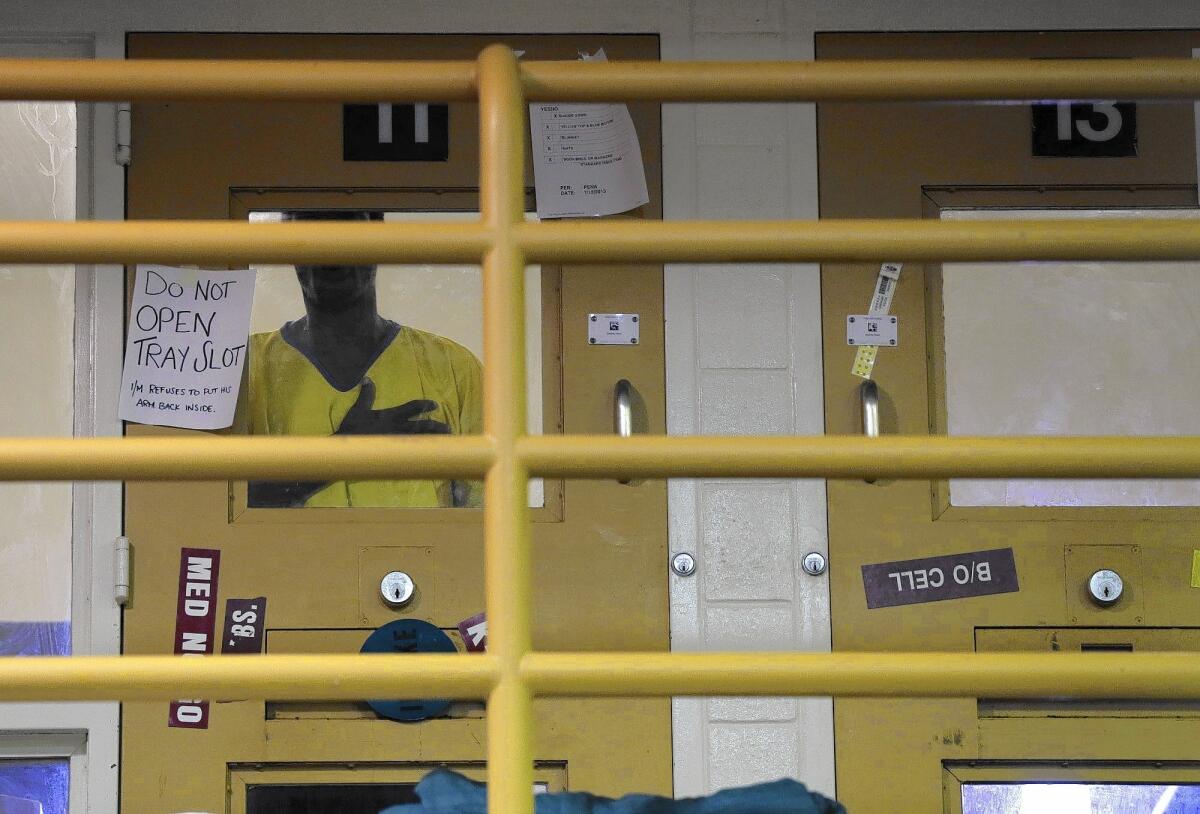L.A. County unable to avert federal oversight of jails

- Share via
Federal officials have rejected a last-ditch effort by Los Angeles County to maintain control over its jails and will move forward with a consent decree to address longstanding problems with mental health care in the troubled facilities.
In a letter sent to the county last week, the Department of Justice said that despite some progress, it remained “concerned about the sustainability and future durability of the reforms.”
The county jails have been monitored by federal officials for the last 12 years under an agreement requiring improvements in treatment of the mentally ill. On June 4, the Department of Justice announced it would seek court oversight of the jails, citing a dramatic increase in inmate suicides.
------------
FOR THE RECORD:
L.A. County jails: In the Oct. 3 LATExtra section, an article about a possible consent decree for the Los Angeles County jails said that county supervisors were expected to consider a proposal to create a special jails unit of attorneys within the county counsel’s office. A spokeswoman for Supervisor Mark Ridley-Thomas, author of the proposal, said the proposed unit would be separate from the county counsel’s office. —
------------
In the Sept. 25 letter, federal officials said they hoped to have a draft of a consent decree ready this week. The county’s written response to the Justice Department’s June 4 letter was not enough to avert federal oversight, given “the severity of the issues” and the failure of the 2002 agreement to sufficiently improve jail conditions, they wrote.
A consent decree would be overseen by a federal judge and probably cost the county millions of dollars to implement.
“We are in active negotiations with the DOJ, but it is premature to discuss any specifics,” Assistant Sheriff Terri McDonald, who oversees custody operations, said in a written statement. “We remain committed to working with DOJ and providing appropriate care to the inmate population.”
Richard Weiss, acting county counsel, said he had received a draft of the consent decree and confirmed that county attorneys met with federal officials Thursday. He offered no details, saying only that “it was a very productive meeting.”
The June 4 letter described “dimly lit, vermin-infested, noisy, unsanitary, cramped and crowded” living conditions that exacerbated inmates’ mental distress. After suicides more than doubled, from four in 2012 to 10 the following year, jail officials did little to address the situation, the letter said, calling many of the suicides preventable.
In an interview Thursday, Supervisor Mark Ridley-Thomas accused the Sheriff’s Department and the county mental health department of not taking the problems in the jails seriously. A federal consent decree would be a black mark on the county, amounting to “dereliction of duty” and “absconding of responsibility,” he said.
“The federal government is saying that they’re throwing ... their hands up,” Ridley-Thomas said. “In other words, they’ve given you every chance to improve up, and you’ve failed to do so.”
According to Ridley-Thomas, he and the other county supervisors were not aware until last year of the 2002 agreement, which required that federal monitors periodically visit the jails and submit written reports to the county. He blamed the county departments, including county attorneys, whom he said were dealing with federal officials without informing the board.
On Tuesday, the Board of Supervisors is scheduled to consider Ridley-Thomas’ proposal to create a specialty jails unit within the county counsel’s office. Attorneys who specialize in jail issues are needed as the county negotiates the terms of federal oversight and implements mental health reforms, the motion states.
Miriam Krinsky, a former federal prosecutor and head of a blue ribbon commission that reviewed violence in the jails, said federal officials should wait to decide whether the next sheriff would be capable of properly reforming the jails before taking the final steps toward obtaining a consent decree.
“The fact that the DOJ remains concerned is not a surprise given the longstanding challenges that have been a constant in the jail,” Krinsky said.
Long Beach Police Chief Jim McDonnell and former Undersheriff Paul Tanaka will face each other in the Nov. 4 sheriff’s election. The winner would take over for John Scott, who has served as interim sheriff since longtime Sheriff Lee Baca retired suddenly in January.
More to Read
Sign up for Essential California
The most important California stories and recommendations in your inbox every morning.
You may occasionally receive promotional content from the Los Angeles Times.











